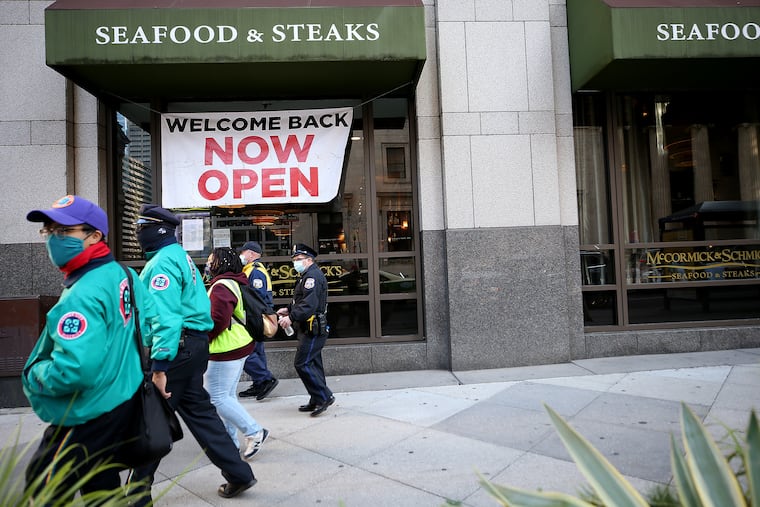Local restaurants are being pushed to the brink. The love of strangers can save them. | Maria Panaritis
What if this pandemic were happening when I was a kid? Would my parents' Upper Darby deli - and my life - be ruined?

We love them. They love us back. They are good people who now, as we barrel toward the holidays at the end of a horrific but increasingly awful pandemic year, need the help of our federal government — for the love of God.
They could have been me.
People who operate or work at restaurants, delis, and gyms are again being pushed toward a cliff in the name of saving lives and hospitals from a pandemic that already has stolen so much in nine months. Already-battered dining establishments are taking hard hits this week as officials desperately try to reduce the roaring return of COVID-19 by curbing business where infections seem to soar.
Too many of us appear comfortable with the carnage.
I am here to show you that you actually aren’t comfortable. I know this. Because I know what food means to you all. It means love from a stranger.
The love of strangers for my sandwich-maker parents is what helped me stay housed as a child. It helped me stay schooled. It helped me earn a degree at St. Joseph’s University even though neither of my immigrant parents had such a luxury for themselves as children in the war-ravaged country of their birth.
What, I have wondered with horror all year, if the pandemic had struck in 1985, when I was a kid and they were running the shop? Would we be ruined?
If Americans were as hateful then as they seem to have become today about helping each other, the answer is yes.
I would have become homeless. I would not be writing for The Philadelphia Inquirer. It would have been the end for me, my two sisters, and the hardworking parents who toiled over a butcher block a half block from the Tower Theater in Upper Darby: my war-orphan father, Chris, and his farmer wife, Pat, whose Greek village had only well water and no electricity when she immigrated to the United States in the early 1960s.
The one thing that could have ensured our survival: pandemic aid from the federal government while business plummeted at the shop.
Sadly, Republicans who control the U.S. Senate and President Trump’s White House have decided such aid is of no use to them politically anymore. They are doing nothing to enact a relief package for either businesses or workers between now and next year.
It is a moral failure. And it is fundamentally unkind to the workers, and to us, their customers.
We all love our food people. We just don’t think about it much until they are gone.
For a weary wage earner or a gilded glutton, a nice meal made by a stranger fills the soul. Food is kinship. We trust the people who make and serve it. That translates to love.
My first lesson in this came, tragically, at age 24.
My dad died of a heart attack on the couch that year after a full day of work at Ariston Deli. The Daily News wrote an obituary about him that included a photo. It spurred an outpouring the likes of which made an impression on my then-naive self.
The obit ended with a note that said we, the family, would be opening the deli for a day of reflection. We were so traumatized, we couldn’t fathom opening to actually serve anyone a damn thing. Somehow, we imagined that customers might want to say hello and hear why the guy they had seen one day was now, the next day, gone.
For years, we had come to know our customers through the distant daily ritual of taking orders and exchanging cash: tuna on rye with Swiss no mayo on the bread; Greek salads with the good feta; Italian hoagies with mayonnaise (a blasphemy, of course).
Little did we know that the feeling of familiarity was mutual.
From the minute we opened for the memorial open house, customers poured in to pay respects. It lasted all day long.
These people who weren’t our relatives were upset. A man they viewed as a friend was suddenly gone. My dad! A place they loved — and maybe that some didn’t even realize up until that point how much they loved — was also suddenly, quite possibly, on the way to extinction.
They adored my dad despite broken English, perhaps because his charm behind the slicer cut through the man’s comical linguistic flubs. Or that he stacked an Italian hoagie with the eye of a sculptor. (As a teenager, I learned years later, he impressed friends back in Greece by meticulously drawing photos that appeared in newspapers.)
I now saw a different creation in the mournful eyes of strangers: a sandwich maker’s bond with fellow Americans over a counter. His deli, sure enough, closed soon after.
Pandemic directives this week to further curb dining are the product of frantic public officials trying to spare us from mass deaths as virus numbers explode locally. Another goal is to prevent hospitals from potential collapse. How many of us would want to be turned away in the weeks ahead when our kids break a wrist or a doctor discovers a cancerous tumor in our bones?
Local officials are doing this because federal ones would rather let the little guys die. This is their speed. If you don’t own or trade stock, tough luck.
Tips and takeout will not be enough to rescue these good people. They are only the bare minimum. The solution is to love food workers the way we know we do. That means insisting that hard-hearted politicians do the same.
Call your U.S. senators immediately. Tell them to save your friends. Before they, too, become extinct.